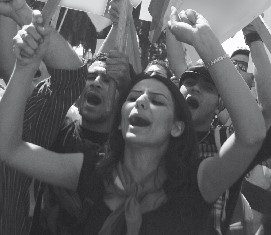A close examination of recent developments in the Euro-Mediterranean region reveals that freedom of association has experienced setbacks in the past few years and there has been very little positive development worth mentioning. Since 2007, some countries have amended their laws on NGOs (Jordan) or have announced changes (Egypt, Syria), while others have recast their legislation in ways that have a direct impact on NGO activities (Israel, Tunisia). The trend observed in the past three years is that new restrictions have been put in place in the name of public order, security and the fight against terrorism.
These restrictions have led to arbitrary denials of registration for many organisations, in particular those active in the human rights field (Libya, Syria, Tunisia), including in promoting diversity and minorities (Greece, Morocco, Syria, Turkey). The restrictions have also taken the form of ever-growing interference in NGO activities by the authorities, for example by impeding their right to peaceful assembly (Algeria, Israel, Egypt), intervening in the affairs of their boards (Syria, Tunisia) or dissolving organisations on arbitrary grounds (Palestine). These measures contradict both the spirit and the letter of Article 22 of the International Covenant on Civil and Political Rights.
These developments have left human rights activists in a deplorable situation, marked by physical and psychological attacks, smear campaigns and restrictions on the freedom of movement of many activists in a number of countries of the Eastern and Southern Mediterranean. Sentences imposed on NGO activists, in some cases by military tribunals, also provide distressing evidence of the trend towards more restrictive policies observed over the past three years.
While there are some positive developments (Lebanon, countries of the European Union), concerns still remain in some of those countries. For instance, the fundamental recognition of the right to freedom of association for
all without any exception − including, for example, members of sexual minorities − has yet to become a reality in some countries.
In light of these and other developments that have taken place in the past three years, both in the legislative domain and with respect to the tight controls imposed by administrative authorities, it is more imperative than ever that the recommendations set forth by the EMHRN in its annual reports be implemented, including those recommendations aimed at the institutions of the European Union in the context of their relations with states of the Eastern and Southern Mediterranean.
The freedom of association project of the Euro-Mediterranean Human Rights Network (EMHRN), funded by the European Commission since 2007, monitors the evolving situation of NGOs, in law and in practice, throughout the Euro-Mediterranean region, on a daily basis. This activity, which has already given rise to three annual reports on freedom of association since 2007, continues this year with a fourth report documenting both the developments related to freedom of association that have taken place since the publication of the last report in December 2009, as well as analysing the broad patterns of progress and setbacks that have emerged since the publication of the first report in December 2007.
Similarly to the previous reports, this fourth report also includes two thematic chapters encompassing the whole Euro-Mediterranean region. This year, the subjects are the funding of associations and the right of non-nationals to form associations.


